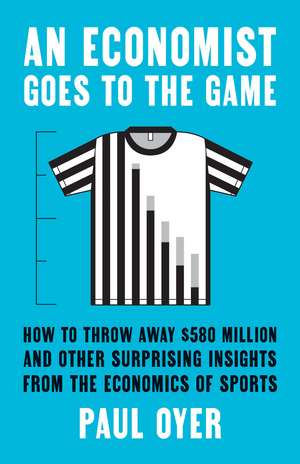An Economist Goes to the Game: How to Throw Away $580 Million and Other Surprising Insights from the Economics of Sports
Autor Paul Oyeren Limba Engleză Hardback – sep 2022
An engaging look at the ways economic thinking can help us understand how sports work both on and off the field
Are ticket scalpers good for teams? Should parents push their kids to excel at sports? Why do Koreans dominate women’s golf, while Kenyans and Ethiopians dominate marathon racing? Why would Michael Jordan, the greatest player in basketball, pass to Steve Kerr for the game-winning shot?
Paul Oyer shows the many ways economics permeates the world of sports. His topics range from the business of sport to how great athletes use economic thinking to outsmart their opponents to why the world's greatest sports powerhouse (at least per capita) is not America or China but the principality of Liechtenstein. Economics explains why some sports cannot stop the use of performance-enhancing drugs while others can, why hundred-million-dollar player contracts are guaranteed in baseball but not in football, how one man was able to set the world of sports betting on its ear—and why it will probably never happen again. This book is an entertaining guide to how a bit of economics can make you a better athlete and a more informed fan.
Preț: 124.51 lei
Preț vechi: 154.93 lei
-18% Nou
23.84€ • 24.33$ • 20.06£
Carte indisponibilă temporar
Specificații
ISBN-10: 0300218249
Pagini: 216
Ilustrații: 3 b-w illus.
Dimensiuni: 140 x 216 x 22 mm
Greutate: 0.4 kg
Editura: Yale University Press
Colecția Yale University Press
Recenzii
"Oyer has given us the definitive Freakonomics for sports—a fun and insightful account of what happens when economic thinking intersects with the world of sports."—Andrew Zimbalist, author of Whither College Sports: Amateurism, Athlete Safety and Academic Integrity
“Paul Oyer applies his considerable analytical skills to study sports phenomena such as corruption, ticket scalping, child prodigies, the Olympics, and many others. I highly recommend this book to sports fans, students, and researchers for some fascinating economic analyses.”—Lawrence M. Kahn, Cornell University
“In Paul Oyer’s new book, we learn a bit about sports and a lot about thinking like an economist. Learning economics is now going to be as much fun as playing ping pong, pick-up basketball, or touch football.”—Roger Blair, author of Sports Economics
Notă biografică
Paul Oyer is the Mary and Rankine Van Anda Entrepreneurial Professor, professor of economics, and senior associate dean for academic affairs at the Stanford University Graduate School of Business and the editor-in-chief of the Journal of Labor Economics. He lives in Stanford, CA.
Descriere
An engaging look at the ways economic thinking can help us understand how sports work both on and off the field
Are ticket scalpers good for teams? Should parents push their kids to excel at sports? Why do Koreans dominate women’s golf, while Kenyans and Ethiopians dominate marathon racing? Why would Michael Jordan, the greatest player in basketball, pass to Steve Kerr for the game-winning shot?
Paul Oyer shows the many ways economics permeates the world of sports. His topics range from the business of sport to how great athletes use economic thinking to outsmart their opponents to why the world's greatest sports powerhouse (at least per capita) is not America or China but the principality of Liechtenstein. Economics explains why some sports cannot stop the use of performance-enhancing drugs while others can, why hundred-million-dollar player contracts are guaranteed in baseball but not in football, how one man was able to set the world of sports betting on its ear—and why it will probably never happen again. This book is an entertaining guide to how a bit of economics can make you a better athlete and a more informed fan.
